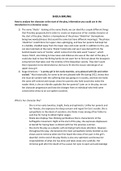SHEILA BIRLING:
How to analyse her character at the start of the play, information you could use in the
introduction in a character essay:
1) The name ‘Sheila’ - looking at the name Sheila, we can identify a couple different things
that Priestley purposely did in order to create an impression of her snobby character at
the start of the play. Sheila is a homophone of the phrase ‘Shield her’ (homophone
being two words/phrases that sound the same but have different meanings). The phrase
‘shield her’ could link to her upper-class upbringing, and how her parents had kept her
in a bubble, shielded away from the lower class and outer world. In addition to this, you
can also look back at the name ‘Sheila’ historically and see it was derived from the
Scottish Gaelic name of ‘Cecilia’, which comes from the latin word “caecus”, which
means ‘blind’, also linking to how naive and oblivious she was at the start of the play. It
could also lead to how the Birling family do not want her to find out about the bourgeois
consumerism that takes over the entirety of the Edwardian society. They don’t want
their reputation to be diminished so she has to fit into the classic stereotype of an
upper-class girl.
2) Stage directions – "a pretty girl in her early twenties, very pleased with life and rather
excited.” Also historically, for some to be very pleased with life during 1912, shows that
she must be content with the suffering that was going on in society, and that she holds
the same self-centred and myopic views her parents also hold (could also make the
reader think, is she an infantile capitalist like her parents? Later on in the play, we see
her character progression and how she changes from an individual who held some
conservative views to an out-spoken socialist).
What is her character like?
- She is in her early twenties, bright, lively and optimistic. Unlike her parents and
her fiancée, she expresses her deep concern and regret for Eva’s suicide. She is
sympathetic to the ideals of socialism; she thinks it was wrong of her father to
sack Eva for trying to obtain higher wages.
- Sheila also displays free-thinking spiritedness that is characteristic of the
Suffragette movement. Right at the start of the play, she expresses displeasure
at Gerald for having been so distant with her the previous summer.
- She starts the play as a playful, self-centred girl who loves attention. However,
throughout the play, she becomes the most sympathetic family member as she
shows severe remorse when she first heard the news of her part in the girl’s
downfall. At the end of the play Sheila is also very optimistic and knows her
responsibilities of what she has done and takes steps very carefully. Her
immense guilt after the death of Eva causes her eyes to open and acknowledge
, all the wrong things she and her family had been committing. By the end of the
play, she represents the younger generation's protests against the morality of
the older generation and seems the most responsive to Goole's views about
moral responsibility towards others.
CHARACTER PROGRESSION IN EVERY ACT:
Significant quotes with analysis:
(Half serious, half playful) ‘Yes – except for all last summer, when you never came near me,
and I wondered what had happened to you’
What can you say about this? How to analyse this quote:
1) Look at stage directions – (half serious, half playful). This suggests that despite Sheila’s
character being quite cheerful and childish, she is also sensible and is holding a grudge
from what happened the last summer. This is the first of many hints that suggests she is
not as perfect as she seems. It also foreshadows the conflict that is to come, as she has
genuine concerns about their relationship but covers this with a flirtatious and jestful
tone.
2) Find another interpretation of the quote, what else could it suggest? – we understand
that the straightforward analysis of this quote would be that she is aware of what had
happened last summer, and how she is slightly mad about it but she covers it with joy. It
could also suggest a number of other things. Her half seriousness challenges the social
construct at the time, as unlike her mother and fathers’ relationship, she is questioning
Gerald’s adultery, which proves she wants her relationship to be based on pure love
rather than a business trade or a monopolising tactic. Priestley uses this quote to
represent the sexism at the time and the oppression of women; they want to speak out
and be “serious”, but gender barriers refrained them from doing so and they were
forced to cover their seriousness with a “playful” and passive attitude.
(Excited) ‘Oh – Gerald – you’ve got it – is it the one ring you wanted me to have?’ AND ‘I was
there this afternoon – (archly to Gerald) for your benefit’.
How to analyse this quote:
1) Word choice, look at her consistent use of the words ‘you’ and ‘your’ – the pronoun
‘you’ implies that Gerald is in control of their relationship, but he also controls Sheila’s
mind-set. The use of a convergent question connotates to the reader that she adheres
to Gerald’s preferences, but her outlook on life also revolves around her husband.
2) Materialistic approach with the ring, did he do that for a reason? – its a symbol of his
dominance within the relationship. Not only is a ring a symbol of love, but it is also a
covenant between two parties. it suggests that since Gerald had the final say, it implies




